

MAP: State of communism around the world. Imagine What They've Been Taught in School: Salon Advocates for Communism. RUSH: Salon.com.

This is a huge piece here. This prints out to six pages. "Why You're Wrong About Communism: 7 Huge Misconceptions About It (and Capitalism) -- Most of what Americans think they know about capitalism and communism is total nonsense," and as I read through this... I'm not gonna read the whole thing to you, but we will link to it at RushLimbaugh.com. As you read through this, if you take the time to do it, this could very easily be the kind of gobbledygook that's being taught in college. "This is not surprising, given our country's history of Red Scares designed to impress that anti-capitalism is tantamount to treason.
Would you like to hear these bogus claims? Socialism Communism Capitalism. Though the term "communism" can refer to specific political parties, at its core, communism is an ideology of economic equality through the elimination of private property.

The beliefs of communism, most famously expressed by Karl Marx, center on the idea that inequality and suffering result from capitalism. Under capitalism, private business people and corporations own all the factories, equipment and other resources called "the means of production. " These owners, according to communist doctrine, can then exploit workers, who are forced sell their labor for wages. The working class — or "proletariat" — must rise up against the capitalist owners, or "bourgeoisie," according to the ideals of communism, and institute a new society with no private property, no economic classes and no profits. Communism differs from socialism, though the two have similarities. In contrast, communists state that capitalist economic and political systems must be completely overthrown through revolution.
Komunismus. Komunismus (z latinského communis = „společný“) (Znak:☭) je především politická ideologie, hlásající a požadující společné vlastnictví a odmítající třídní rozdíly mezi lidmi.
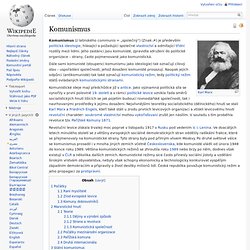
Jeho zastánci jsou komunisté, zpravidla sdružení do politické organizace – strany, často pojmenované jako komunistická. Dále sami komunisté (stoupenci komunismu jako ideologie) tak označují cílový stav – uspořádání společnosti, jehož dosažení komunisté prosazují. Naopak jejich odpůrci (antikomunisté) tak také označují komunistický režim, tedy politický režim států ovládaných komunistickými stranami. Komunistické ideje mají předchůdce již v antice. Jako významná politická síla se vynořily v první polovině 19. století a v rámci politické levice vznikla řada směrů socialistických hnutí lišících se jak pojetím budoucí rovnostářské společnosti, tak i navrhovanými prostředky k jejímu dosažení. Communism. Communism is represented by a variety of schools of thought, which broadly include Marxism, anarchism and the political ideologies grouped around both.
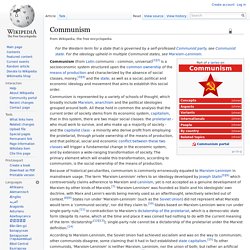
All these hold in common the analysis that the current order of society stems from its economic system, capitalism, that in this system, there are two major social classes: the proletariat - who must work to survive, and who make up a majority of society - and the capitalist class - a minority who derive profit from employing the proletariat, through private ownership of the means of production, and that political, social and economic conflict between these two classes will trigger a fundamental change in the economic system, and by extension a wide-ranging transformation of society.
Q&A: China's Third Plenum. 8 November 2013Last updated at 02:31 ET By Dong Le BBC Chinese Service Economic reform and a widening wealth gap are key issues for China's leaders As China's top leaders prepare for the Third Plenum, the BBC looks at why the meeting matters and how it came to be such a significant economic and political event.
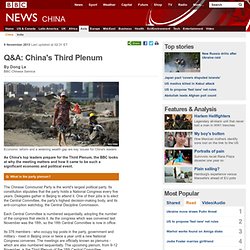
The Chinese Communist Party is the world's largest political party. Its constitution stipulates that the party holds a National Congress every five years. Delegates gather in Beijing to attend it. Each Central Committee is numbered sequentially, adopting the number of the congress that elects it. Its 376 members - who occupy top posts in the party, government and military - meet in Beijing once or twice a year until a new National Congress convenes. Komunistická strana Číny. Tento článek potřebuje aktualizaci, neboť obsahuje zastaralé informace.
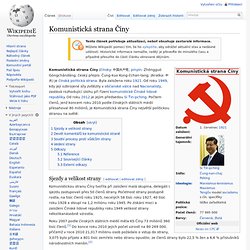
Můžete Wikipedii pomoci tím, že ho vylepšíte, aby odrážel aktuální stav a nedávné události. Historické informace nemažte, raději je převeďte do minulého času a případně přesuňte do části článku věnované dějinám. Komunistická strana Číny (čínsky: 中国共产党; pinyin: Zhōngguó Gòngchǎndǎng; český přepis: Čung-kuo Kung-čchan-tang; zkratka: 中共) je čínská politická strana. Byla založena roku 1921. Communist Party of China. While the CPC is still committed to communist thought, mainstream foreign opinion believes the party to be non-ideological.
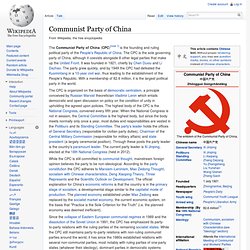
According to the party constitution the CPC adheres to Marxism–Leninism, Mao Zedong Thought, socialism with Chinese characteristics, Deng Xiaoping Theory, Three Represents and the Scientific Outlook on Development. The official explanation for China's economic reforms is that the country is in the primary stage of socialism, a developmental stage similar to the capitalist mode of production. The planned economy established under Mao Zedong was replaced by the socialist market economy, the current economic system, on the basis that "Practice is the Sole Criterion for the Truth" (i.e. the planned economy was deemed inefficient). Since the collapse of Eastern European communist regimes in 1989 and the dissolution of the Soviet Union in 1991, the CPC has emphasized its party-to-party relations with the ruling parties of the remaining socialist states.
History[edit]